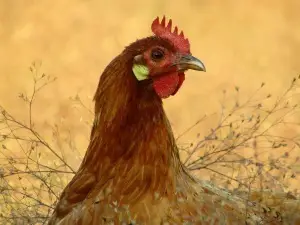
Chickens are pretty fragile creatures, they can be easily injured. A chicken may sustain an injury because of a predator attack, because it jumped off of a high height, or because of another chicken in the flock.
If your chicken becomes injured on its neck, and the bird is running around with an open wound, this article will be a guide on what to do.
Table of Contents
Open wound on a chicken neck:
If your bird has an open wound on its neck then you’d need to follow these steps to help it:
Wash your hands:
You’d need to wash your hands before you touch your bird. Doing this will keep any bacteria on your hands from spreading to your bird’s open wound and vice versa.
You can wear vinyl gloves as an added measure when handling the bird
Stop the bleeding:
If the bird’s neck is bleeding you’d need to stop the bleeding as soon as possible, chickens can die from a loss of blood.
You can use a paper towel, gauze, or a clean towel to stop the bleeding. Place your item of choice on the bird’s neck and firmly, but gently, press on the bird’s neck to stop the bleeding.
Blood stop powder can also be applied to the bird’s neck to help stop the bleeding.
Clean the wound:
Clean the wound by rinsing the bird’s neck with a saline solution and then cleaning the area with either a water and betadine mixture, vetericyn wound care spray, or chlorhexidine 2% solution spray.
If the bird’s wound is very deep, or particularly dirty, then you’d need to use a syringe to spray chlorhexidine 2% solution or a freshly mixed Dakins solution into the bird’s wound.
Dakin’s solution can be made by mixing one teaspoon of baking soda and one tablespoon of bleach into one gallon of water
Some recommend using an alcohol-based product on the chicken’s wounds, this may help to some extent but it is not recommended because it burns like fire on the wound.
Trimming the feathers around the wound on the bird’s neck is also recommended as it will help you better see what’s going on.
Apply a treatment:
You’d need to treat and keep an eye on the wound to keep it from becoming infected. Use vetericyn wound and infection care spray on the bird’s neck wound three times a day until the bird’s neck is healed.
Raw honey is said to help your bird’s wound heal faster as it will help keep the area moist, which helps with the healing.
Isolate her:
After you’ve wrapped the bird up you’d need to place her in a stress-free environment to heal. Make sure that this environment has a comfortable temperature, and is isolated.
Also, make sure that the bird is given access to food and water while in this environment. It’s especially important to make sure that the bird stays hydrated as it recovers.
If the bird can’t get up and drink, offer the bird water using a syringe, a dropper or a spoon. You can also feed the bird food through a syringe or tube feed the bird.
Create a recovery space using a pet kennel/carrier or a dog crate. Use a soft material, like pine shavings or a soft towel, at the bottom of the space to keep her comfortable.
The crate/carrier can be left in your basement, garage, or anywhere quiet and away from the coop. Transport your bird from coop to crate wrapped in a towel, the towel will keep the bird calm as it is being moved.
Letting other birds have access to your injured bird while it’s healing is not recommended, if access is allowed, the other flock members will see the red wound and will peck at it. This pecking at the wound can lead to the bird’s death.
Offer electrolytes:
Feeding the injured bird electrolytes will also help, electrolytes will hydrate the bird and help the bird recover from the shock of the injury.
You can make a homemade electrolyte solution for your bird or, you can offer the bird Pedialyte if you can’t make a homemade solution.
You can add the electrolyte solution to your bird’s drinking water. Only offer electrolytes to your bird for 3 days, no more.
Pain management:
Giving the bird pain medication will also help. Chickens try to avoid showing signs of pain, this is evolutionary, but if the bird’s neck is wounded then the bird is very likely in a lot of pain.
Help the bird by offering it 5 regular (325mg) aspirin tablets crushed and mixed into a gallon of water. Your vet may also recommend Meloxicam 1,5mg/ml oral solution to your bird.
If you enjoyed this article then you may also be interested in other chicken related articles. Here are some articles that you may be interested in: Chicken Attacked By A Dog And Is In Shock, Chickens Wound Smells, Vetrx For Scaly Leg Mites, Dislocated Hock Joint Chicken, Baby Chick Is Limping, Black Spots On Chicken Legs

